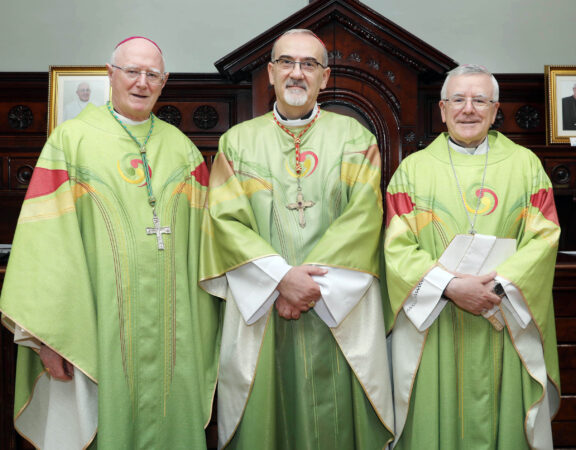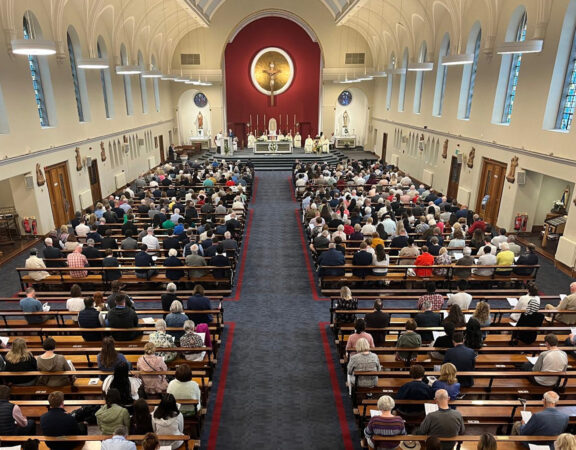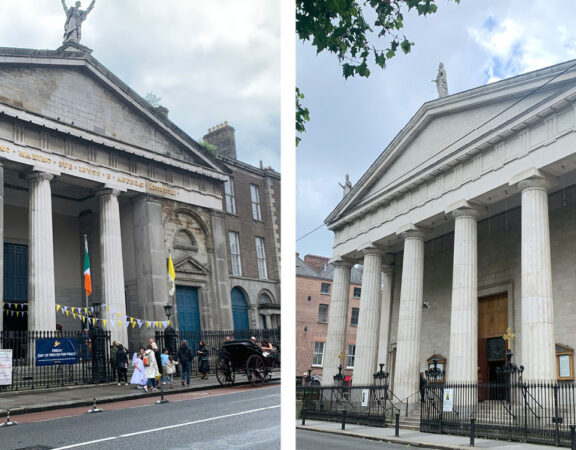WILL IRELAND BE CHRISTIAN IN 2030?
Speaking notes of
Most Rev. Diarmuid Martin
Archbishop of Dublin, Primate of Ireland
Patrick MacGill Summer School, Glenties, 18th July 2005
A few weeks ago I was surprised by a remark on a German television talk show by Gregor Gysi, the leader of the German Communist Party, who when asked about his worries about German society said: Ich fuerchte eine Gottlose Gesellschaft , I fear a Godless society .
It was an unusual comment from the leader of a communist party, with its roots in the former East Germany. As the television debate continued, this declared atheist noted that German society needs the moral framework that only those Christian roots embedded in his society can give. He noted that even the highly moralistic code of the communist ideology in the German Democratic Republic was effectively rooted in Christian principles.
These comments struck me in particular since the speaker was never a Christian. He is personally of Jewish background and the territory of the German Democratic Republic was that part of Germany where religious practice was always and still is exceptionally low.
It is hard to deny that there is a sense then in which our Western societies even when they appear to be de-Christianised still retain vestiges of a Christian culture which possesses a unique capacity for moral cohesion. No other philosophical or political basis has ever done so quite so well.
Ireland is undergoing today a process of secularisation which many would see moving towards the situation described by Gysi: a secularised society which still turns to a cultural religious ethos to hold together and build the most effective consensus possible around a network of values which society needs at least at certain moments. Perhaps Ireland may be like that in 2030 but does that mean that Ireland would be Christian?
Of course one should really begin with the question, is Ireland Christian today? Is it more or less Christian that it was twenty, fifty or one hundred years ago? I believe that we do not really have enough solid research into the nature of the change in religious adherence. As Archbishop of Dublin I am surprised at the superficiality and the anecdotal evidence I am presented with when I ask about concrete pastoral options and about the situation of the faith in Ireland.
There are the regular surveys about how many people say they believe in God or attend Mass regularly or which denomination or faith they adhere to. But we need more clarity concerning what questions people are really answering when they respond to such a survey.
As an aside, let me also note that at times the results of such surveys are often interpreted and spun in not the most objective way. For example, if it is said that 60% of Irish people attend regular Sunday Mass, the comments are that numbers are down, that we have fallen behind Poland and that somehow we are on the brink of the end. What political party would be gasping for breath if it were told, not only that it had the support of 60% of the population, but that 60% of the population attended Cumman meetings every week! There is no room for complacency, but Christianity is healthily present in Irish society.
But let me come back to the question of what people mean when they answer a survey saying they believe in God. Belief is a complex matter. Because of its nature it is difficult to quantify. People will answer questions about belief in different ways. Belief is not identical with Church affiliation. There are non-practising Catholics who are genuine believers and there are also many who practice but who may not really believe. I have even seen recently the term non-believing priest !
Faith is about a relationship and relationships can be of differing quality. What I would be interested in learning is not about numbers but about the quality of the faith relationship. My task as a bishop is to preach and witness to the word of God and to preside over a Church community which will lead people and communities to live a deeper personal relationship with Jesus Christ; a relationship that stimulates hope, meaning, identity and freedom.
In ordinary language having faith in a person is about trust. Faith is something that goes beyond seeing or knowing. There is a deeply personal dimension to the concept of faith, as opposed to seeing or knowing. Faith requires personal trust and is impossible without that love which recognises the fidelity and the trustworthiness of the other in whom I place my trust.
Faith is different from seeing or knowing. If what I see turns out to be an illusion, I may be disappointed. My knowledge may be wrong but I can set out to find correctives. But when someone I trust fails me, there is a deep personal feeling of having been betrayed, deceived and misused by someone to whom I had offered something that is deepest in any human relationship.
Religious faith is faith in God, but not in some generic God of our own creation. For the Christian, God is not an anonymous element or power within or above the universe; God is first of all a face. Christians believe in a God who has spoken, who has revealed himself, who has entered into dialogue with humankind, a dialogue of love. Indeed the Christian God is in himself relationship, that relationship of the Trinity which is driven by the desire to reveal a saving love that is superabundant and gratuitous.
Too often that faith based on love and forgiveness has been distorted into an exacting, negative rule-book. Others have distorted the concept of freedom and security which faith should bring. I am amazed, for example, at the insecurity that surrounds the faith of so many. Faith should be a relationship which makes people free and secure in a mature fashion. A relationship which engenders insecurity, anxiety and fear is not the Christian relationship of faith in God.
There are, moreover, forms of new religious experience today which seem to provide security, but what they really offer is only flight from insecurity. They seem to leave people secure because they help people evade reality in its fullness and to avoid especially the risk which is an essential dimension of faith. Faith in God must be mediated within the realities of the world in which we live. Christian faith, as faith in Jesus Christ, is incarnation and not flight.
I have gone to some lengths to describe what Christian faith is like. It is far from just a vague cultural Christianity, whether this is cultural Catholicism or cultural Anglicanism , terms which at times seem to reflect a brand, a corporate culture or even a tribe, rather than what is essential in faith.
Even more so, faith is not just a vague cultural spirituality . Spirituality, despite the seemingly obvious meaning of the word, may in fact be entirely material, with no true openness to the transcendent. I remember at the UN Conferences of the 1990 s we would have debates on the appropriateness of UN documents containing references to spirituality and spiritual values. In general, the pluralist European countries were not enthusiastic, as they feared that this might imply some positive reference to religion (which would be a secularist mortal sin). On the other hand, the Russia of the early Gorbachev administration was appealing for spirituality and even the Chinese supported the requests of the Holy See conceding that their system admitted spirituality: Chinese socialist spirituality , the Ambassador hastily added.
There is something fundamental in human yearning that seeks the spirit, meaning and hope. There is something in the human spirit which aspires to ask deeper questions about the meaning of life and to identify what are the deepest realities.
Many will find their path in secular spirituality and they will live out their worldview with dedication, idealism, generosity and satisfaction. For others, seeking spirituality may indeed be a sign of seeking the transcendent and be a first opening to faith. The originality of faith is however that it is not of our construction, it is response to a personal action of God. It is response to an invitation made to me in my personal situation. Faith is the recognition that God loves me personally.
In that sense faith is always surprise and risk. It is the surprise that God has sought me out personally and asks me to respond. That relationship was described by Pope Benedict XVI in his inaugural address in Saint Peters Square now some months ago: We are not some casual and meaningless product of evolution. Each of us is the result of a thought of God. Each of us is willed, each of us is loved, each of us is necessary. There is nothing more beautiful than to be surprised by the Gospel, by the encounter with Christ
Will Ireland be Christian in the year 2030? It depends on how well the Church caries out its mission. That mission is determined however by the nature of faith. I would be very surprised if in the year 2030 Ireland was a totally pagan land, if there was not residual presence in Irish society of the values of Christianity and that that presence was not the major inspiration for the ethos of the country, even though it would be a question of generalised adherence to such an ethos with a generous range of interpretation and tolerance regarding what that ethos actually implies.
My primary interest, however, is in seeing that as many Irish men and women as possible in 2030 will be allowing themselves to be daily surprised by the Gospel and will be attempting to make that leap of faith and then shaping their lives coherently according to consequences of their belief.
Whether that happens or not will be determined by the style and the pastoral structures of the Church today. I believe, for example, that many in our society fail to make the leap to faith, because we, as Church, as an institution and as a community of believers, have never made that leap to the full. We have never fully abandoned ourselves to the God who can make us free, but still cling on to the things we falsely feel can bring us security. Faith is always a leap in the dark, but in the confidence that Jesus has not left us orphans. We will never be able to lead others into the depths of faith and the joy of our hope if we remain entrapped in the limitedness of our current world vision.
This does not mean however that believers in 2030 will be sitting back happy to live passively as a minority within a pluralist society. Faith cannot be lived in isolation from culture and reality.
On the one hand, the possibility of living faith is influenced by society. Faith needs a social and cultural environment which will allow it to grow, to flourish in freedom and to make its contribution to society. Ireland in 2030 may well be more pluralist, but let us hope that that pluralism is not that of the intolerant type which attempts to marginalise religious expression totally away from the public square.
On the other hand, for faith to interact with culture, believers must be more coherent in their engagement with the realities of the world. Prayer, for example, is the moment in which our faith is expressed in its deepest and most concrete form. But prayer is not a flight from the world. It is the moment in which we recognise that the God who is other is a real dimension of our reality, of the reality of my life. When we pray we recognise the lordship and the transcendence of God. Recognising the lordship and transcendence of God we recognise that we did not create the world with our own hands and that we should never attempt to set ourselves up in the place of God. If creation is the Lord s, how can we not share the wealth of the world equitably, how could we squander the resources of creation, how could we maltreat or abuse or exploit any other person? The deeper the faith of the believer, the more he or she will bring their irreplaceable contribution to the dialogue concerning the good of society.
In some areas this dialogue with society may have to be counter-cultural. I have recently commented, for example, that I am not sure that we have fully grasped what are the long-term consequences of pervasive secularisation and individualisation on the institution of marriage. It is not possible to reconcile every trend with the Gospel. We have to find ways of stressing the value of mutuality in marriage and the value of marriage as an institution, and not just in sacramental terms, but in terms of what it signifies for society. If we simply stand aside and drift along with contemporary culture we will have failed to bring to our societies precisely the type of constructive engagement between the Gospel message and contemporary culture that is needed.
To achieve this type of mature Christian faith in today s world we have to revolutionise our structures of faith formation as a life-long task. I was struck that the first request that the Dublin Diocesan Women s Forum, established by my predecessor, Cardinal Connell, was not about a women s issue , but about faith formation! Being a believer is not an easy task today.
The pastoral structures of the Church must be structured in such a way that the believer, young and old, knows that he or she belongs to a community which desires that they be free, responsible and fully human. A Church with participatory structures will be more effective in this task than an authoritarian one. I had here written an authoritative clerical one . But authoritarianism is not a clerical monopoly: there is authoritarianism among lay persons also: an authoritarian conservative ideology and indeed an authoritarian progressive one.
We need to enter into a new dialogue of engagement about faith with our young people. We need to let young people feel that they are part of the Church and give them responsibility in our communities. They need to be engaged and challenged.
We are making progress in his area. This is where I see that the data generally made available is deceptive and deficient. The data can note a fall in numbers. I would say, however, that alongside a fall in numbers of those who attend Sunday Mass, I regularly encounter parish communities that have never been so vibrant than they are today. The more participation the stronger the Church community is. I have asked, for example, that Parish Pastoral Councils be established in all parishes. This might appear to be an administrative measure, but what has happened is that when the invitation was made seeking those who wished to be more active in their parish, people came forward in their hundreds. They came to parish assembles and they have committed themselves to be active in ministries and services. There are also other examples which come from new spiritual movements and small groups, most often driven by lay persons.
Will Ireland be Christian in 2030? The answer will not be determined by this years or next years survey. This years and next years survey, and that of 2030, will be determined by the way we work today to rejuvenate the Church, to bring new vitality to its structures, by the way our Church communities and institutions really are Church, places where the knowledge and the love of God prevails.
Our communities must aim at being communities of mature faith, but they should not become elitist ghettoes. The Church by its nature must be open and it must open a path of welcome for those who are still journeying, who are still seeking, of those who are still weak, of those who are sinners. If we can continue today to build such vibrant communities they will be the ones who will put flesh and blood onto that more nebulous Christian ethos which Ireland will have inherited in 2030. The message of the Gospel will be as relevant as ever in 2030. We must ensure that the right messengers are there: men and women formed in faith, authentic witnesses to the love and healing power of Jesus.
I am confident that the Ireland of 2030 will not be a Godless society, but one where the love of God lived out by men and women will continue to surprise and open new ways for all.







